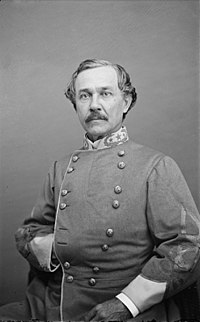Joseph R. Anderson
| Joseph Reid Anderson | |
|---|---|
 |
|
| Born |
February 16, 1813 Fincastle, Virginia |
| Died | September 7, 1892 (aged 79) Isles of Shoals, New Hampshire |
| Place of burial | Hollywood Cemetery Richmond, Virginia |
| Allegiance |
|
| Service/branch |
|
| Years of service | 1836–1837 (USA) 1861–1862 (CSA) |
| Rank |
|
| Battles/wars | |
| Other work | Industrialist |
Joseph Reid Anderson (February 16, 1813 – September 7, 1892) was an American civil engineer, industrialist, and soldier. During the American Civil War he served as a Confederate general, and his Tredegar Iron Company was a major source of munitions and ordnance for the Confederate States Army. Starting with a small forge and rolling mill in the mid-1830s, It was a flourishing operation by 1843 when he leased it. He eventually bought the company outright in 1848 and forcefully and aggressively built Tredegar Iron Works into the South's largest and most significant iron works. When the Civil War broke out he entered the Army as a Brigadier General in 1861. Shortly after he was wounded and then resigned from the Army returning to the iron works. It was the confederacies major and for much of the war only source of cannons and munitions, employing some 900 workers, most of whom slaves. His plant was confiscated by the United States In 1865, but returned to him in 1867 and he remained president until his death. Anderson was very active in local civic and political affairs.
Joseph Reid Anderson was born at "Walnut Hill" near Fincastle, the county seat of Botetourt County, Virginia in 1813. The grandson of Scotch-Irish immigrants, he was the son of Colonel William Anderson (1764–1839) and Anne (née Thomas) Anderson. The elder Anderson had served in the American Revolutionary War, and was also a colonel of a Virginia regiment in the War of 1812. Joseph's father was a self-taught engineer and surveyor and was later responsible for the building of the turnpike that is now U.S. Route 220 and (for part of the way) U.S. Route 60 from Fincastle to Covington. Col. Anderson's son was to follow in similar work.
...
Wikipedia
